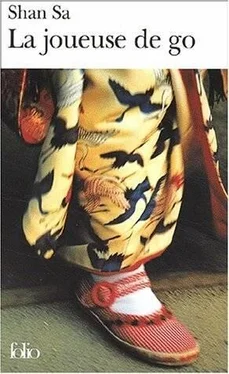Shan Sa - La joueuse de go (chinese)
Здесь есть возможность читать онлайн «Shan Sa - La joueuse de go (chinese)» весь текст электронной книги совершенно бесплатно (целиком полную версию без сокращений). В некоторых случаях можно слушать аудио, скачать через торрент в формате fb2 и присутствует краткое содержание. Жанр: Современная проза, на китайском языке. Описание произведения, (предисловие) а так же отзывы посетителей доступны на портале библиотеки ЛибКат.
- Название:La joueuse de go (chinese)
- Автор:
- Жанр:
- Год:неизвестен
- ISBN:нет данных
- Рейтинг книги:5 / 5. Голосов: 1
-
Избранное:Добавить в избранное
- Отзывы:
-
Ваша оценка:
La joueuse de go (chinese): краткое содержание, описание и аннотация
Предлагаем к чтению аннотацию, описание, краткое содержание или предисловие (зависит от того, что написал сам автор книги «La joueuse de go (chinese)»). Если вы не нашли необходимую информацию о книге — напишите в комментариях, мы постараемся отыскать её.
In war-torn Manchuria of the 1930s, two lives briefly find peace over a game of go in Shan Sa's third novel, The Girl Who Played Go (translated by Adriana Hunter). The unnamed characters, a Japanese soldier stationed in China and a 16-year-old Manchurian girl, narrate their stories in alternating first-person chapters. For the girl, the struggles of Independent Manchuria take a back seat to her discovery of love and the awakening of her sexuality. For the soldier, his idealized dreams of samurai honor and imperial conquest are slowly displaced by homesickness, troubled recollections of his earthquake-torn youth, and remorse over a lost love. But the solitary concerns of each character are eventually submerged by the tides of war. The girl's first lover, Min, is a revolutionary. His ardor for his virgin conquest is matched by a doomed patriotism. Simultaneously, the soldier comes to relish the girl's home town, Thousand Winds, in Southern Manchuria, and becomes distrustful of his own nationalism. His daily games of go with the young female stranger awaken a new passion in him that becomes entwined with admiration for her aggressive play.
As they hardly speak, the soldier and the girl's views of each other remain clouded in Sa's technically facile narrative maneuvers. Where the soldier sees love, the girls sees escape. By maintaining the first person, Sa (winner of the French Prix Goncourt du Premier) leads the reader not only to experience the Japanese and Manchurian perspectives of the occupation, but also she offers glimpses into the deep failure inherent in cross-cultural and cross-generational communication. Couple with the rich historical detail, Sa's narrative games reward close reading amidst the briskly paced spiral into tragedy. -Patrick O'Kelley
From Publishers Weekly
In her first novel to appear in English (her two previous novels, published in French, won the Prix Goncourt and the Prix Cazes), Sa masterfully evokes strife-ridden Manchuria during the 1930s. The first-person narration deftly alternates between a 16-year-old Chinese girl and a Japanese soldier from the invading force. As in the Chinese game of go, the two main characters-the girl discovering desire, the soldier visiting prostitutes, both in a besieged city-will ultimately cross paths, with surprising consequences for both. Sa's prose shifts between lavish metaphor-the girl's sister, grieved by an adulterous husband, is "not a woman but a flower slowly wilting"-and matter-of-fact concision ("We weary of the game and kill them," the soldier says of two Chinese prisoners, "two bullets in the head"). The most absorbing subplot is Sa's careful rendering of the girl's sexual awakening. Though at first intrigued by a liaison with a revolution-minded student, she is reluctant to enter adulthood, a state she views as fraught with injury and falsehood, "a sad place full of vanity." To escape her increasingly troubled life, she becomes a master at go, eventually taking on the soldier, who is in disguise. As the two meet to play, they gradually become entranced, even while war rages around them. The alternating parallel tales add an extra spark of energy to this swift-moving novel, as Sa portrays tenderness and brutality with equal clarity.
***
Japan 's bloodbath in China during the 1930s began in Manchuria, a resource-rich region in northeast Asia. This prelude to World War II in the Pacific haunts Shan Sa's story of young lovers whose worlds collapse in a typhoon of despair. The Girl Who Played Go, the fiction winner of the 2004 Kiriyama Prize, has an economy of prose that allows the novel to cover an epic time, while focusing on the tragedy of a Chinese girl who loves a Japanese boy. This boy comes to her as an enemy soldier trying to maintain his father's samurai ethic; she comes to him as a member of an aristocratic Manchu yellow-banner family that has served the Qing emperors in Peking. His side is on the rise, hers in decline.
The protagonists meet in a public park, a place where one can play the ancient board game of Go. Both play masterfully, initially knowing nothing of each other's identity. They are strangers in a game of strategy, much like their political leaders in Tokyo and Nanking. The interplay of two youngsters and two empires drives the narrative, allowing the author to counterpoise the Japanese story with its Chinese counterpart. Family portraits from both sides illuminate two teenagers driven to adulthood before their time, cheated of a full youth and the critical years when they might have discovered their humanity – already a challenge in a time of terror and terrorism with the Manchurian war regressing into bitter guerrilla fighting, which results in atrocities on both sides.
Shan's voice is unmistakably Chinese – feminine but hard, finely tuned and precise. Not a word is wasted, no excess of emotion shown. She colors her background with a few swift strokes that a master calligrapher would admire. Her dialogue has a staccato rhythm, somewhat like a Chinese Hemingway with bullet prose. Ornamentation is not for Shan, stark reality is.
More than pleasure, readers will become involved in a healing process. As horrific as the war was, its aftermath has brought a dreadful hatred between the former enemy states. Japan bashing dominates much of what comes through in recent Chinese literature. This book offers a way around the sepsis wasting away a possible healing. Shan has created two life-loving youths shattered in a hellish war that carries them and millions like them to early deaths. Even-handed in her treatment of both main characters, she allows a reader to see the richness of both Japanese and Chinese culture, making us imagine how they might each enrich the other once again
Reviewed by Patrick Lloyd Hatcher






